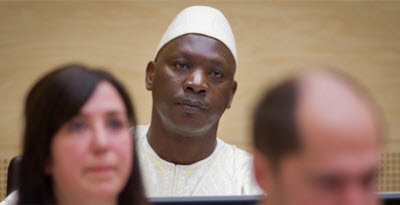
The Presiding Judge, Adrian Fulford, delivered a summary of the Trial Chamber’s decision during an open hearing held today. He explained that the Chamber considered the gravity of the crimes in the circumstances of this case, with regard, inter alia, to the extent of the damage caused, and in particular “the harm caused to the victims and their families, the nature of the unlawful behaviour and the means employed to execute the crime; the degree of participation of the convicted person; the degree of intent; the circumstances of manner, time and location; and the age, education, social and economic condition of the convicted person”.
He highlighted that the crimes for which Mr Lubanga has been convicted, comprising the crimes of conscripting and enlisting children under the age of 15 and using them to participate actively in hostilities, are undoubtedly very serious crimes that affect the international community as a whole. The Presiding Judge added that the “vulnerability of children mean that they need to be afforded particular protection that does not apply to the general population, as recognised in various international treaties”.
Judge Fulford indicated that the Chamber has, however, reflected certain other factors involving Mr Lubanga, namely his notable cooperation with the Court and his respectful attitude throughout the proceedings.
Judge Elizabeth Odio Benito has written a separate and dissenting opinion on a particular issue. She disagrees with the Majority’s decision to the extent that, in her view, it disregards the damage caused to the victims and their families, particularly as a result of the harsh punishments and sexual violence suffered by the victims of these crimes.
Related articles
- • Jean-Pierre Bemba named MLC presidential candidate (July 13, 2018)
- • ICC Confirms 14-Year Sentence Against Thomas Lubanga (December 1, 2014)
- • ICC Case Against Bemba Wrapping Up as Another Opens (November 12, 2014)
- • Denis Mukwege Wins Sakharov Prize 2014 (October 21, 2014)
- • ICC confirms war crimes charges against Bosco Ntaganda (June 10, 2014)
- • Senior UN officials urge Brazzaville to halt expulsion of DR Congo nationals (May 26, 2014)
- • ICC sentences Germain Katanga to 12 years (May 23, 2014)
- • ICC finds Germain Katanga guilty of war crimes and crime against humanity (March 7, 2014)
- • Bosco Ntaganda Attacked Civilians on Ethnic Grounds, ICC Prosecutor Says (February 10, 2014)
- • U.S. Sanctions Rwanda Over Use of Child Soldiers by M23 Rebels (October 4, 2013)
- • DR Congo Asks Rwanda to Turn Over M23 Rebel Leaders (July 26, 2013)
- • Rebel Leader Bosco Ntaganda Makes First Appearence Before the ICC (March 26, 2013)
- • Bosco Ntaganda in the International Criminal Court's custody (March 22, 2013)
- • Warlord Bosco Ntaganda Turns Himself In at US Embassy in Rwanda (March 18, 2013)
- • Obama Tells Kagame to Stop Support for M23 Rebels in Eastern Congo (December 19, 2012)
- • International Criminal Court Acquits Mathieu Ngudjolo Chui (December 18, 2012)
- • U.S. Sanctions M23 Rebel Leaders (December 18, 2012)
- • The M23 Rebels Want to Overthrow Kabila? Nonsense (November 28, 2012)
- • U.S. Treasury Department Sanctions M23 Rebel Leader (November 13, 2012)
- • Gunmen attack anti-rape doctor Denis Mukwege (October 26, 2012)
- • UN Security Council condemns 'any and all outside support' to M23 rebels (October 19, 2012)
- • M23 Rebels Committing War Crimes (September 11, 2012)
- • Kagame May Face War Crimes Charges at the ICC, Says US Official (July 26, 2012)
- • US Cuts Military Aid to Rwanda Over Support to Rebels in DR Congo (July 21, 2012)
- • DR Congo, Rwanda Sign Pact to Fight Rebels in Eastern Congo (July 15, 2012)
- • U.S. Tells Rwanda to Stop Supporting Rebels in DR Congo (July 2, 2012)
- • Kagame Is A Problem for The U.S. and The U.K. (June 23, 2012)
- • ICC Prosecutor Seeks 30 Years for Thomas Lubanga (June 13, 2012)
- • Congo Army Advances On Rebels Holdout, Says Official (June 5, 2012)
- • Rwanda Should Stop Aiding War Crimes Suspect Bosco Ntaganda: Human Rights Watch (June 4, 2012)







